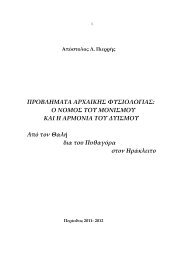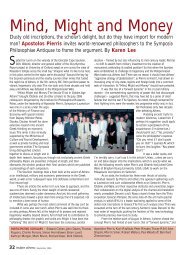chapter 10 the monism of darkness and the dualism of limit and ...
chapter 10 the monism of darkness and the dualism of limit and ...
chapter 10 the monism of darkness and the dualism of limit and ...
Create successful ePaper yourself
Turn your PDF publications into a flip-book with our unique Google optimized e-Paper software.
54 CHAPTER <strong>10</strong><br />
Snake (probably as <strong>the</strong> Uroboros that surrounds <strong>the</strong> World, cf. e.g.<br />
Acta Thomae 32) enters into <strong>the</strong> Cosmic Womb <strong>of</strong> Impurity <strong>and</strong> thus<br />
Man is born: <strong>the</strong> impure <strong>and</strong> most-suffering (appleÔÏ˘appleԛ̈Ó) Womb<br />
nei<strong>the</strong>r loves nor recognises nor admits inside her any form o<strong>the</strong>r than<br />
that <strong>of</strong> <strong>the</strong> primaeval Serpent. For this reason when <strong>the</strong> perfect Logos<br />
<strong>of</strong> <strong>the</strong> Light above wills to descend into <strong>the</strong> world in order to redeem<br />
from <strong>the</strong> embrace <strong>of</strong> Darkness <strong>the</strong> effulgence <strong>of</strong> its radiance <strong>and</strong> <strong>the</strong><br />
spiritual breath that are imprisoned in nature wailing <strong>and</strong> crying for<br />
liberation from <strong>the</strong> bonds <strong>of</strong> impurity <strong>and</strong> disorder, Logos deceives <strong>the</strong><br />
Womb <strong>of</strong> Abomination <strong>and</strong> penetrates her in <strong>the</strong> form <strong>of</strong> her beloved<br />
reckless <strong>and</strong> lawless Wind, <strong>the</strong> Primordial Snake. After <strong>the</strong> completion<br />
<strong>of</strong> <strong>the</strong> abominable mysteries <strong>of</strong> <strong>the</strong> Womb, Logos is purified toge<strong>the</strong>r<br />
with <strong>the</strong> entire con-substantial sequence <strong>of</strong> light <strong>and</strong> spirit as well as all<br />
<strong>the</strong> intellects (Ùa âÓ ÁÓÒÛÂÈ appleÓ‡̷ٷ Ùɘ àÏËı›·˜) by means <strong>of</strong><br />
<strong>the</strong> chalice <strong>of</strong> upsurging living water, <strong>the</strong> cosmic semen, <strong>the</strong> warrant <strong>of</strong><br />
Salvation (19 §§19-21). 13<br />
4. The proximity <strong>and</strong> connection <strong>of</strong> <strong>the</strong> analysed systems <strong>and</strong><br />
<strong>the</strong>ories with one ano<strong>the</strong>r is manifest. One characteristic feature <strong>of</strong><br />
Phoenician <strong>the</strong>ologies was <strong>the</strong> importance attributed to <strong>the</strong> serpent, as<br />
Philo, allegedly following Sanchouniathon, reports in detail (790<br />
FrGrH F4; Eusebius, Praeparatio Evangelica I, <strong>10</strong>, 45-53). This<br />
feature is directly related to <strong>the</strong> Ophitic Gnosis <strong>and</strong> Philo himself<br />
identifies <strong>the</strong> origin <strong>of</strong> Pherecydes’ <strong>the</strong>ory on Ophioneus <strong>and</strong> <strong>the</strong><br />
Ophionites in Phoenician models (Eusebius op. cit. I, <strong>10</strong>, 50 = 7 B4<br />
DK). With reference to <strong>the</strong> philosophical <strong>the</strong>ology <strong>of</strong> first principles<br />
<strong>the</strong> salient feature <strong>of</strong> this group <strong>of</strong> beliefs is a radical or mediated<br />
Dualism between an active life-generating principle <strong>of</strong> motion <strong>and</strong> a<br />
passive principle <strong>of</strong> reception, between energetic fullness <strong>and</strong> inert<br />
indeterminacy. The first principle is conceived as fertilizing breath,<br />
Wind <strong>of</strong> impulse, Spirit <strong>of</strong> life; <strong>the</strong> second as Abyss <strong>of</strong> Waters,<br />
Darkness <strong>of</strong> Chaos. 14 Philo Judaeus declares <strong>the</strong> life-generating power<br />
<strong>of</strong> wind’s breath that permeates water, Quaestiones et Solutiones in<br />
Genesin IV, 5: ultima vero divinorum sortitus est aer, animans<br />
creaturas congregatas. Nam si aer non tangat moveatque aquam,<br />
emoritur ista; vivifica autem magis comperitur non aliunde nisi aere in<br />
eam intermixto. According to <strong>the</strong> Babylonian <strong>the</strong>ology, in <strong>the</strong><br />
beginning <strong>the</strong>re was <strong>the</strong> Darkness <strong>of</strong> <strong>the</strong> Abyss <strong>of</strong> Water from which










